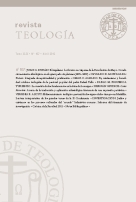Por favor, use este identificador para citar o enlazar este ítem:
https://repositorio.uca.edu.ar/handle/123456789/7576| Título: | Casta meretrix. Acerca de la traducción y aplicación eclesiológica frecuente de una expresión patrística | Autor: | Giudice, Hernán Martín | Palabras clave: | IGLESIA CATOLICA; SANTIDAD; PECADO; Ambrosio de Milán, Santo, ca. 340-397; PATRISTICA | Fecha de publicación: | 2012 | Editorial: | Universidad Católica Argentina. Facultad de Teología | Cita: | GIUDICE, Hernán, Casta meretrix. Acerca de la traducción y aplicación eclesiológica frecuente de una expresión patrística [en línea]. Teología, 107 (2012) Disponible en: https://repositorio.uca.edu.ar/handle/123456789/7576 | Resumen: | Resumen: Muy a menudo se escucha hablar de la Iglesia como santa y prostituta o como santa y pecadora, invocando como argumento decisivo que los Santos Padres decían que la Iglesia es una casta meretrix. Algún que otro teólogo lo pone por escrito sin citar la fuente; lo mismo dice algún predicador. Según parece, este testimonio patrístico cuadraría para poder hablar de los pecados de la Iglesia. Ahora bien, respecto a esta fórmula lo primero que hay que señalar es que se trata de un hapax de la literatura patrística, sólo se encuentra una vez en San Ambrosio. La figura retórica utilizada indica algo insólito que el lector moderno debe tratar de entender. Sobre todo, porque para quien acuñó la frase, lejos de aludir a algo pecaminoso, quiere indicar la santidad de la Iglesia. El artículo presenta la reflexión eclesiológica de este padre de la Iglesia que lo lleva a expresarse de esa manera y, a la vez, invita a situar en su contexto y en sus perspectivas concretas las afirmaciones patrísticas para traducirlas, interpretarlas y relacionarlas con nuestro modo de plantear los problemas. Abstracts: Frequently one hears the Church being called holy and prostitute, or as holy and sinful, using as a compelling argument the saying of the Holy Fathers that the Church is a casta meretrix. More than one theologian cites this in writing without quoting the source; some preachers do the same. It seems that this Patristic witness fits in well for one to talk about the sins of the Church. So far so good, however, the first thing to be noted is that this is a hapax in Patristic literature and is found just once in Saint Ambrose. The use of this rhetorical figure indicates something unusual; this modern reader must try to understand. Especially because the one who coined the phrase, far from referring to something sinful, was pointing to the holiness of the Church. This article is a ecclesial reflection on this father of de Church who expressed himself in this way and, at the same time, it invites one to consider the context and concrete perspectives of these Patristic sayings in order to translate, interpret and relate them to our way of confronting problems. |
URI: | https://repositorio.uca.edu.ar/handle/123456789/7576 | Disciplina: | TEOLOGIA | Derechos: | Acceso Abierto | Fuente: | Versión original impresa en Sistema de Bibliote cas UCA: Teología Tomo XLIX, N° 107, (Abr.-2012) |
| Aparece en las colecciones: | TEO - 2012 Tomo XLIX n° 107 |
Ficheros en este ítem:
| Fichero | Descripción | Tamaño | Formato | |
|---|---|---|---|---|
| casta-meretrix-acerca-traduccion-aplicacion.pdf | 264,58 kB | Adobe PDF |  Visualizar/Abrir |
Visualizaciones de página(s)
873
comprobado en 30-abr-2024
Descarga(s)
581
comprobado en 30-abr-2024
Google ScholarTM
Ver en Google Scholar
Este ítem está sujeto a una Licencia Creative Commons

